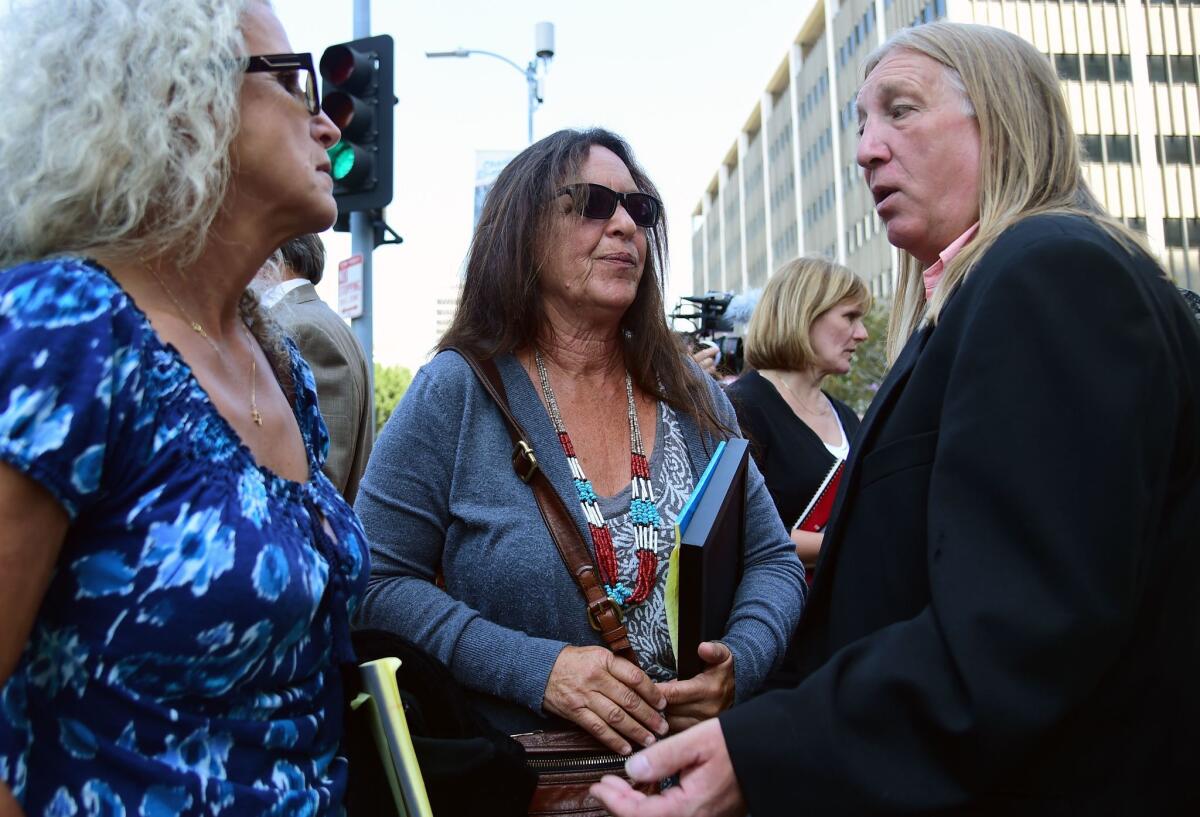Spirit musician’s estate to appeal ruling in Led Zeppelin ‘Stairway to Heaven’ case

The estate of musician Randy California, of L.A. rock band Spirit, intends to appeal the jury verdict last month that found that Led Zeppelin did not lift music that formed the basis for the group’s hit “Stairway to Heaven” from an earlier Spirit instrumental, “Taurus,” court documents show.
The unanimous verdict, from an eight-member jury following seven days of testimony in U.S. District Court in Los Angeles, concluded that even though Zeppelin songwriters Jimmy Page and Robert Plant may have heard “Taurus” before they composed “Stairway,” the songs were not musically similar enough to rise to the level of copyright infringement.
Attorney Francis Malofiy, who represented plaintiff Michael Skidmore in bringing the case to court 45 years after “Stairway to Heaven” was originally released, said after the verdict was announced that Zeppelin’s team “won on a technicality.”
He was referring to Judge R. Gary Klausner’s ruling that only the original sheet music for “Taurus,” which was registered with the U.S. Copyright Office in 1968, rather than Spirit’s audio recording of the song, could be admitted during the trial.
The prospect of succeeding with this appeal, filed July 23, “is a huge uphill battle because it went all the way to the jury,” said intellectual property law specialist Larry Iser, partner at Los Angeles-based firm Kinsella Weitzman Iser Kump & Aldisert.
“Based on what was sound musicological evidence, the jury concluded there was no infringement,” he said. “Had the judge taken it away from the jury early, [the plaintiff] might have had an easier time on appeal.”
Klausner’s decision was consistent with copyright infringement cases involving music recorded before a copyright law revision in 1972 extended federal protection to sound recordings. Before 1972, only sheet music was covered by federal copyright law.
Malofiy’s co-counsel, Glen Kulik, told The Times following the verdict that their inability to play the Spirit recording during the trial constituted “an insurmountable obstacle” to their case.
Skidmore charged that Zeppelin had stolen the famous opening of “Stairway” from a similar-sounding passage about 45 seconds into “Taurus,” the instrumental from Spirit’s 1968 debut album written by Randy Wolfe, better known by his nickname Randy California. Zeppelin’s team successfully argued that similar sections of the two songs are common musical elements and are not protected under copyright law.
In the aftermath of the jury’s decision, Zeppelin’s music publisher, Warner/Chappell Publishing, which was one of the defendants in the case, requested that Skidmore be required to pay nearly $800,000 in legal fees and expert witness costs that Zeppelin’s team incurred for its defense of the two Rock and Roll Hall of Fame musicians, record label Rhino Records and the publisher.
Additionally, Malofiy was suspended in June from practicing law for three months over “serious misconduct” in a previous case.
A court panel determined that he violated various rules of conduct in another infringement case he argued involving Usher’s hit “Bad Girl,” raising the issue of how an appeal might proceed if Skidmore chose to pursue one. Malofiy is still listed as Skidmore’s attorney of record in the appeal motion.
In the course of the seven-day Zeppelin trial, Malofiy raised more than 100 objections that were overruled by Klausner, who admonished him multiple times during the case.
Reached Tuesday by phone, Peter J. Anderson, lead attorney for the Zeppelin legal team, declined to comment on the motion to appeal.
A spokeswoman for Warner/Chappell Music told The Times, “The company is declining to comment on the appeal.”
Follow @RandyLewis2 on Twitter.com
For Classic Rock coverage, join us on Facebook
ALSO
Led Zeppelin didn’t steal music for ‘Stairway to Heaven,’ jury finds
Sound familiar? ‘Stairway to Heaven,’ ‘Taurus’ and other sound-alike songs
UPDATES:
12:33 p.m.: This article was updated with comment from Warner/Chappell Music. This article was originally published July 26 at 3:50 p.m.
More to Read
The biggest entertainment stories
Get our big stories about Hollywood, film, television, music, arts, culture and more right in your inbox as soon as they publish.
You may occasionally receive promotional content from the Los Angeles Times.







